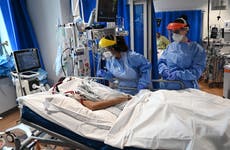Analysis: The NHS is not ready to tackle the debilitating effects of ‘long Covid’
‘We heard from people who are still unable to work, study or care for dependents several months after their initial infection’

Your support helps us to tell the story
From reproductive rights to climate change to Big Tech, The Independent is on the ground when the story is developing. Whether it's investigating the financials of Elon Musk's pro-Trump PAC or producing our latest documentary, 'The A Word', which shines a light on the American women fighting for reproductive rights, we know how important it is to parse out the facts from the messaging.
At such a critical moment in US history, we need reporters on the ground. Your donation allows us to keep sending journalists to speak to both sides of the story.
The Independent is trusted by Americans across the entire political spectrum. And unlike many other quality news outlets, we choose not to lock Americans out of our reporting and analysis with paywalls. We believe quality journalism should be available to everyone, paid for by those who can afford it.
Your support makes all the difference.A new report has warned of a widespread hidden impact of coronavirus on thousands of patients who are suffering from the so-called “long Covid” phenomenon and struggling to get help from the NHS.
The work by National Institute for Health Research reveals the challenge for the health service in being able to meet the needs of patients suffering the after-effects of the Covid-19 virus.
Some patients are still reporting problems seven months on from their infection.
Among the “roller coaster of symptoms” they face include organ damage to their heart or lungs, problems with their kidneys, livers or skin as well as breathlessness, chronic fatigue, “brain fog” and anxiety.
Clinicians behind the work say the health service will need to train new staff to work with these patients and in effect create almost a new branch of generalist medicine because of the wide array of symptoms being reported by patients.
This represents a major challenge to a health service that already struggles to treat patients with multiple conditions and needs. The modern NHS is a specialist service and sometimes fails to consider the patient as a whole and the interactions of their various conditions on each other.
The researchers also warned of the need to increase awareness and knowledge among GPs, nurses and doctors to make sure patients reporting long Covid symptoms were properly identified.
Not all the patients affected by long Covid were seriously ill in hospital – some had only mild infections and never reported a cough or a fever, for example.
Even people who had an initially mild bout of the disease are now reporting extremely debilitating conditions now impacting on their daily lives.
The problem is compounded by the fact long Covid itself is not easily defined with the NIHR review suggesting it could be split into four distinct syndromes with differing symptoms, some of which patients can suffer from simultaneously.
Dr Elaine Maxwell, review author, said: “We know from a number of surveys both in the UK and across the world, that a significant number of people experience ongoing effects after a Covid-19 infection.
“The list of symptoms is huge and covers every part of the body and brain.
“We heard from people who are still unable to work, study or care for dependents several months after their initial infection.”
She emphasised that some patients had told the researchers they had not been believed when they reported their concerns to the NHS.
“There are people who never had any support in hospital, never had a test, have no record of ever having had Covid, except their own personal history. They may be suffering far more than somebody who was ventilated for 21 days,” added Dr Maxwell.
NHS England has said it will invest £10m in a network of “long Covid” clinics but how capable these will be with coping what could be tens of thousands of patients remains to be seen.
Dr Maxwell told The Independent the clinics were a welcome step but a longer term investment in workforce training would be needed to ensure the health service could properly meet the needs of long Covid sufferers.
The NIHR is also planning more research to better understand the scale and impact of the problem.

Join our commenting forum
Join thought-provoking conversations, follow other Independent readers and see their replies
Comments